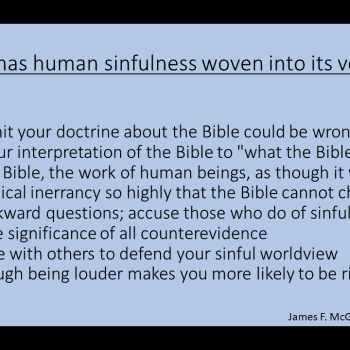For a long time, there was nothing – at least, as far as translations of even small snippets and quotations of Mandaean literature into English are concerned. Then, translations began to be made – but not, for whatever reason, of the Mandaeans’ two most central and important sacred texts, nor of many others. When it comes to those, for almost a century there have been nothing but small translated excerpts in English, tantalizing hints at what one might encounter if one knew the relevant obscure dialect of Aramaic and distinctive script, or if complete translations were available.
I have been working for much of the past decade on a project that aimed to rectify this situation, at least for the case of the Book of John. That projects fruits will soon be available. But I am sure that there will still be a great many people who will not read this work in its entirety merely because they can.
Longtime readers of this blog will know my perspective on this topic – assuming, of course, they don’t just read excerpts and snippets from what I write here. I wrote a post about “The Bible’s Greatest Hits” in which I compared reading only excerpts from the Bible leaves one with a partial and distorted impression of that corpus of literature. I compare it to being a fan of a band while only knowing their most famous songs.
Now, I fully acknowledge that there is more literature that demands and deserves to be read than any person has time for. We cannot help but pick and choose.
But I am also painfully aware of how many academics who have read at most snippets of Mandaean literature may nonetheless have strong views on matters of their origins and history, and their relevance to our understanding of the history of Judaism and Christianity as well as Gnosticism – views that are rendered completely implausible by multiple passages that they haven’t read.
There is important information on the B side of singles that never broke into the top 40, when trying to get a full and rich perspective on a band’s history. And within texts like not only the Ginza and Book of John, but also The Thousand and Twelve Questions and Haran Gawaita, there are crucial clues about these matters. The latter two works have been available in English for a long time. But they can be painfully obscure and in many ways uninteresting, unless one is already fascinated by these matters.
And so I am aware of the usefulness, indeed the necessity, of excerpts as an entry point into a religion’s or band’s or composer’s work. It is perfectly OK to start with the account of Jesus’ baptism in the Book of John much as some might start their encounter with the band Genesis via “That’s All.”
But if you stop there, you certainly won’t have a real sense of what the fuller picture looks like.
And that’s what excerpts and greatest hits can be especially good for – luring people in to explore, grabbing attention and extending an invitation.
That’s what I’ve done sometimes here when I’ve made meme images from quotations, or shared part of a post on someone else’s blog with a link there. And that’s what I’ll do with the new translation of the Mandaean Book of John, hoping to get people who don’t immediately gravitate towards reading it to discover why they should.
And that’s what Rick Brannan did in his post that I’m sure he never envisaged would inspire me to write a post like this one. But it did. Take a look to see which passages from the Apostolic Fathers he shared as the essential ones that everyone absolutely must read.
Have a listen as well to the selections that the New York Times shared recently, on the recommendation of a number of musicians, composers, and critics, in an effort to get people to fall in love with “Classical” music.
What’s your experience of the benefits and pitfalls of the circulation of excerpts, “greatest hits,” memes with quotes, and other such things, whether from the Bible, a band, academic writers, or anyone or anything else?













